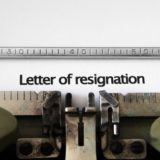Resignation Letters: Do’s and Don’ts
Here at Career Solutions Group, we often meet with individuals who have decided to leave or have recently left their job. This decision often happens for a variety of reasons, depending on the person and situation. Needless to say, such a transition should be handled with grace. Our career counselor, David, wrote a great article on Tuesday outlining how to leave a job without burning bridges. One important aspect he mentioned in his article was the letter of resignation.
Whether or not you feel a letter of resignation is warranted, it’s important that you write one. It offers a clean break, both for you and the company. In addition, you can keep it for your records, and the company can keep it for theirs. Writing a rational, clean letter of resignation will help smooth any ruffled feathers, as well as offer closure.
To help you prepare for writing a letter of resignation, here are some basic Do’s and Don’ts:
- Do list the position you are resigning from and the company’s name. This is a letter that will be kept as a record, so you want to clearly state your function at the time of your resignation. Something like, “Please accept this letter as formal notice that I will be resigning from my position as _________________ with _________________.” This sort of phrasing works well at the beginning because it is clear and concise.
- Don’t feel the need to list all the reasons you are leaving. Especially if your feelings towards the company are less than congenial, don’t feel compelled to tell the organization why you have decided to leave. You are under no obligation to do so. Additionally, if you want to use the company as a reference in the future, it’s best to leave on good terms.
- Do thank the company for the opportunities offered to you. Again, even if you feel angry or upset, chances are you learned some skills in the position that will help you in the future. You applied for that position at some point in the past, so at some point you thought it was a good idea. On the flip side, if you feel positively towards the company, mention your good feelings. Thank them for the opportunity; explain a few things you learned in the position, and move forward.
- Do explain that you will wrap up your duties as best you can, and offer to train team members. But….
- Don’t promise to do anything you can’t follow through on. Just make sure they know that you will continue to put forth your best effort until the conclusion of your duties.
- Finally, don’t get overly emotional. If you had a good time at the company, feel free to include your appreciation for them. But if you had a bad time, don’t allow your emotions to get the best of you. The business world is extremely interconnected, and you never know who you’ll need a reference from in the future. Be calm, be professional, and be rational.
In addition to a letter of resignation, you should set up a meeting with your supervisor to explain the reasons for your departure and when you will be formally leaving. This is good practice, as it allows you to give any measured criticism about the position and thank your direct supervisor in person for the opportunities you were given. This also allows them a period of adjustment prior to your departure.
Keep in mind that leaving a company is often just as stressful for your employer as it is for you. Try and make the transition as seamless as possible, and don’t get caught up in past judges. After all, the hope is that you are moving on to bigger and better things!
Career Solutions Group specializes in assisting job seekers to make career transitions. For more information, or to set up a free initial consultation, email us at info@careersolutionsgroup.net, or call us at 970-224-4042 to set up a complimentary consultation with one of our career counselors.
By: Julia Pillard, Career Solutions Group

